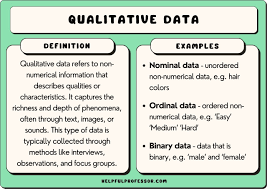Exploring the Value of Qualitative Data in Research

The Importance of Qualitative Data in Research
Qualitative data plays a crucial role in research, providing valuable insights and understanding that quantitative data alone cannot capture. Unlike quantitative data, which focuses on numerical measurements and statistical analysis, qualitative data deals with non-numeric information such as opinions, attitudes, behaviours, and motivations.
One of the key strengths of qualitative data is its ability to provide depth and context to research findings. By exploring the nuances and complexities of human experiences, qualitative research can uncover rich and detailed information that helps researchers gain a deeper understanding of the subject matter.
Qualitative data is particularly useful in exploratory research when the goal is to generate hypotheses or theories. Through methods such as interviews, focus groups, observations, and content analysis, researchers can gather rich qualitative data that lays the foundation for further investigation.
Another advantage of qualitative data is its flexibility. Researchers have the freedom to adapt their approach during data collection based on emerging insights or unexpected findings. This flexibility allows for a more dynamic and responsive research process.
Qualitative data also plays a vital role in giving a voice to participants. By capturing their perspectives, experiences, and emotions in their own words, researchers can ensure that the study reflects the complexity and diversity of human experiences.
In conclusion, qualitative data adds depth, context, richness, and participant voices to research projects. When used alongside quantitative data, it provides a comprehensive understanding of complex phenomena and contributes to meaningful insights that drive innovation and progress in various fields.
Understanding Qualitative Data: Key Questions Answered
- What is qualitative data?
- What are the methods used to collect qualitative data?
- How is qualitative data different from quantitative data?
- What are the advantages of using qualitative data in research?
- How can researchers ensure the reliability and validity of qualitative data?
What is qualitative data?
Qualitative data refers to non-numeric information that provides insights into the attitudes, behaviours, experiences, and motivations of individuals or groups. Unlike quantitative data that focuses on numerical measurements and statistical analysis, qualitative data is gathered through methods such as interviews, focus groups, observations, and content analysis. It offers a rich and detailed understanding of human experiences by exploring the nuances and complexities of the subject matter. Qualitative data is valuable for generating hypotheses, theories, and in-depth insights in research projects across various disciplines.
What are the methods used to collect qualitative data?
In qualitative research, various methods are employed to collect data that capture the richness and depth of human experiences and perspectives. Common methods used include interviews, focus groups, observations, and document analysis. Interviews allow researchers to engage directly with participants to explore their thoughts, feelings, and experiences in-depth. Focus groups bring together a small group of individuals to discuss a specific topic or issue, providing insights into shared beliefs and attitudes. Observations involve systematically watching and recording behaviours in natural settings to understand social interactions and contexts. Document analysis involves reviewing written or visual materials such as texts, images, or videos to extract valuable information relevant to the research question. By employing a combination of these methods, researchers can gather comprehensive qualitative data that informs their study findings and contributes to a nuanced understanding of the research topic.
How is qualitative data different from quantitative data?
Qualitative data differs from quantitative data in its nature and focus. While quantitative data involves numerical measurements and statistical analysis, qualitative data deals with non-numeric information such as opinions, attitudes, behaviours, and motivations. Qualitative data provides rich, detailed insights into the complexities of human experiences, offering depth and context to research findings that quantitative data alone cannot capture. Qualitative research methods, such as interviews, focus groups, observations, and content analysis, allow researchers to explore subjective perspectives and generate hypotheses or theories. In contrast to the structured nature of quantitative data collection, qualitative data collection is more flexible and adaptive, enabling researchers to respond to emerging insights during the research process. Ultimately, qualitative data adds a human touch by giving voice to participants and capturing their unique perspectives in their own words.
What are the advantages of using qualitative data in research?
When considering the advantages of using qualitative data in research, it becomes evident that this approach offers a deeper understanding of the complexities and nuances within a given subject. Qualitative data allows researchers to explore the richness of human experiences, opinions, behaviours, and motivations in a way that quantitative data alone cannot capture. By delving into the context and meaning behind the numbers, qualitative research provides valuable insights that can lead to the development of theories, hypotheses, and innovative solutions. Furthermore, the flexibility of qualitative methods enables researchers to adapt their approach based on emerging insights, ensuring a more dynamic and responsive research process. Overall, the use of qualitative data enhances the depth, richness, and participant voices in research projects, contributing to a more comprehensive and holistic understanding of various phenomena.
How can researchers ensure the reliability and validity of qualitative data?
Ensuring the reliability and validity of qualitative data is essential for maintaining the credibility and trustworthiness of research findings. Researchers can employ several strategies to enhance the reliability and validity of qualitative data. Firstly, employing rigorous data collection methods such as triangulation, member checking, and peer debriefing can help verify the consistency and accuracy of the findings. Additionally, ensuring transparency in data analysis processes, maintaining detailed documentation of research procedures, and conducting thorough data coding and thematic analysis can contribute to the trustworthiness of qualitative data. By adhering to established research standards, critically reflecting on biases and assumptions, and engaging in continuous validation processes, researchers can strengthen the reliability and validity of their qualitative data.
